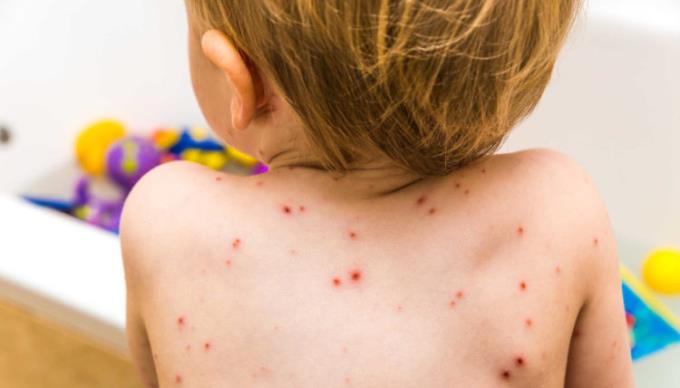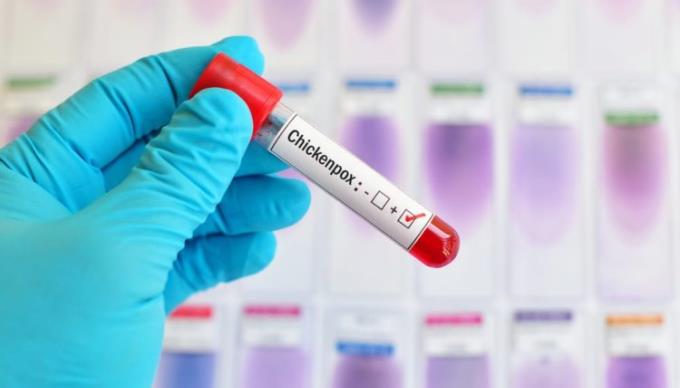Ways to determine an infants caloric needs

Learn how to determine your baby’s caloric needs, including the calories in breast milk and formula, to ensure your infant gets the right nutrition for healthy growth.
Although not as common as it used to be, chickenpox (chickenpox) is still present and can cause serious effects in children. Here's what you need to know about chickenpox to prevent it.
Chickenpox , also known as chickenpox, is a disease caused by the varicella zoster virus . Although many of us have been sick as children, we still cannot fully understand the information about them. Pediatric specialists say that many years ago, chickenpox was considered benign and inevitable as a child. However, chickenpox is less common today thanks to a vaccine that was first used in the United States in 1995. The truth is that the disease is usually mild in most babies, it can only get worse. in children, teenagers and adults. Let aFamilyToday Health read the following article so that parents can better understand chickenpox.
Chickenpox starts with a erythematous, bullous, itchy rash on the skin of the face and body that then spreads throughout the body. The bullae can float all over the place including the mouth, eyelids, and genital area. The chickenpox rash changes from red to blistering and then scarring. Other symptoms of the disease include fever, headache and fatigue. Disease usually appears 5–10 days.
Chickenpox can spread quickly through the air when an infected person coughs or sneezes. It also spreads through contact with the discharge from bullous rashes. A person with chickenpox can spread it to others from two days before the rash and until the pulp has formed a scar. If exposed to the varicella zoster virus, it takes about 10–21 days to develop illness. If your child has chickenpox, he or she should stay home from school until the rash has completely healed, usually 6–7 days after the rash. Children should also be kept away from other babies who have not had chickenpox or have been vaccinated.
For most healthy children, chickenpox, the same symptoms such as itching, rash and fatigue will cause much more uncomfortable than dangerous. In some cases, chickenpox can lead to serious complications such as dehydration, pneumonia, hemorrhage , encephalitis (edema), skin infection, toxic shock syndrome, and osteoarthritis. Subjects such as infants, adolescents, adults, pregnant women, and people with impaired immunity due to disease or drugs, are at high risk of complications from chickenpox. Even healthy children and adults can get severe chickenpox. Prior to the chickenpox vaccine, chickenpox caused 11,000 Americans to be hospitalized and between 100–150 people died each year, according to the US Centers for Disease Control.

Before chickenpox vaccine was introduced in the United States in 1995, chickenpox was one of the most common childhood illnesses. Each year there are more than 4 million cases and 90% of children get the disease under 9 years of age. In 2010, the number of chickenpox cases decreased by more than 80% in children and 90% in babies. The way to maintain this low number is that parents should get their children vaccinated on time.
According to the CDC and the American Association of Family Physicians, the surest way to protect your child against chickenpox is to get them vaccinated. The effectiveness of the vaccine has been demonstrated over a period of more than a decade. Almost 100% of healthy people can prevent chickenpox. The combined efficacy rate is 80–85%, which means that 15–20% of vaccinated people may get chickenpox, but they will have mild illness. According to the US Department of Health and Health, they will have less than 50 cold sores (compared to 500 blisters for people without vaccinations), have no fever or mild fever, and have fewer other symptoms.

DCD and AAP recommend that children get two injections of chickenpox vaccine; the first nose at 12–15 months of age and the second at 4–6 years old (the second nose may be at least 3 months earlier than the first). People over 13 years of age and older are also encouraged to get the shot. They also gave two shots at least 28 days apart.
If your child has chickenpox, don't be surprised that the pediatrician isn't asking you to take him or her to hospital right away. Hospitalization increases the risk of infection in the waiting room.
If your child has a fever, you can give him a fever-reducing medicine acetaminophen. The CDC recommends that never give aspirin to a child. Use of aspirin has been linked to severe Reye's syndrome, which affects the liver and brain. Ibuprofen is also not recommended because it increases the risk of dangerous skin infections caused by streptococci.
When your child is sick, give them an oatmeal bath and apply calamine lotion to help relieve itching. Trim your child's fingernails and advise them not to scratch the balloon that causes infection and scarring.
The antiviral drug, acyclovir, can relieve symptoms but it is only used for certain situations (such as children with eczema or asthma) and is not usually intended for healthy children with uncomplicated chickenpox .
The AAP recommends that you take your baby to the pediatrician when the fever is higher than 39 ° C, has a fever for more than 4 days or any signs of a bacterial infection (e.g. hot rash, pain to the touch, a very red or melted rash. pus). Another case that needs immediate medical attention is when the baby has a fever and a rash has spread. The doctor will take a more careful examination to make sure the baby really has chickenpox and that there are no complications.
After having chickenpox, the varicella zoster virus can remain in the body in inactivated form. The virus can reactivate years later, causing shingles. According to the CDC, there are about 1 million cases of shingles each year in the US. Anyone who has had chickenpox can get shingles, but the risk increases with age. A shingles vaccine is available now and is recommended for people over 60 years of age.
Learn how to determine your baby’s caloric needs, including the calories in breast milk and formula, to ensure your infant gets the right nutrition for healthy growth.
Discover the top 5 smartest dog breeds in the world, including Border Collie, Poodle, German Shepherd, Golden Retriever, and Doberman Pinscher. Learn about their unique traits and why they are considered the most intelligent dogs.
Discover 7 nutritious and delicious ways to cook egg porridge for babies, including recipes with cheese, pumpkin, tomato, and more. Learn how to prepare baby-friendly egg porridge with our expert tips.
After a series of medical measures they obtained a complete human vascular system profile.
Watermelon is one of the fruits that many people love, not only cheap but also delicious, nutritious and refreshing in the summer. To get delicious watermelon pieces, show off your housewives, your artistic talents to cut beautiful pieces of watermelon.
aFamilyToday Health - The digestive system and body in each baby is different. Parents need to recognize notes to deal with when babies have a food allergy!
Babies need many factors for perfect development. aFamilyToday Health shares with parents things to keep in mind when babies are 8 weeks old so that parents can take care of their babies the best!
Babies need many factors for perfect development. aFamilyToday Health shares with parents things to keep in mind when babies are 18 weeks so that parents can take care of their babies the best!
Babies need many factors for perfect development. aFamilyToday Health shares with parents things to keep in mind when babies are 28 weeks old so that parents can take care of their babies the best!
Babies need many factors for perfect development. aFamilyToday Health shares with parents things to keep in mind when babies are 32 weeks old so that parents can take care of their babies the best!








